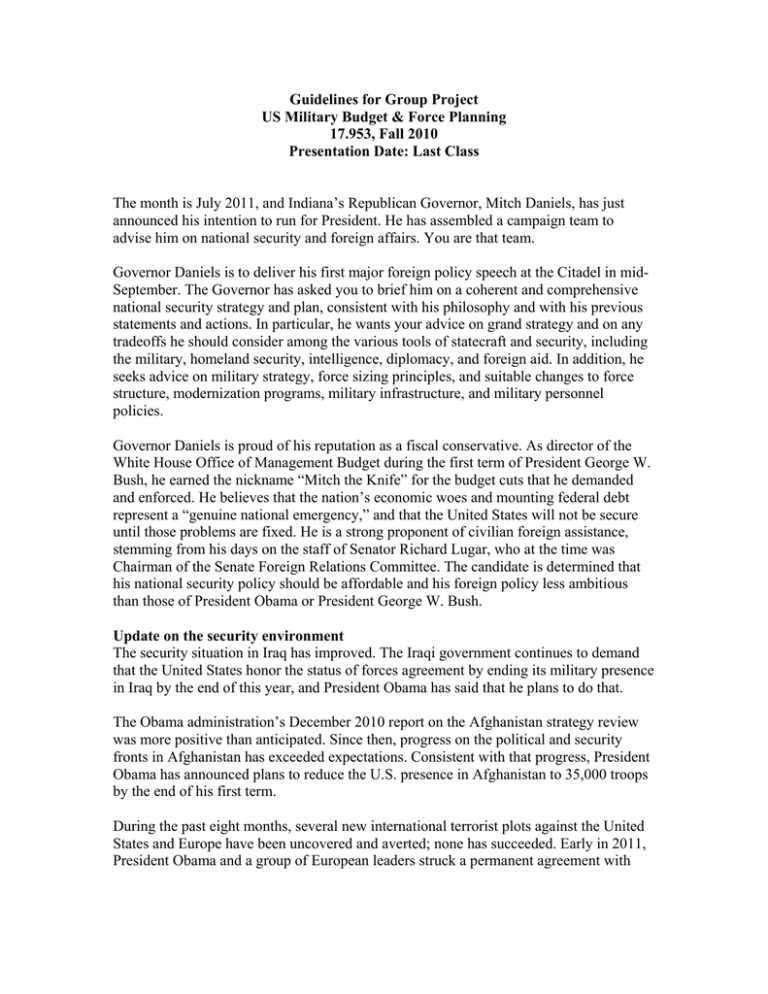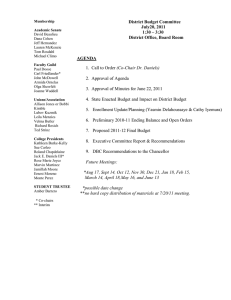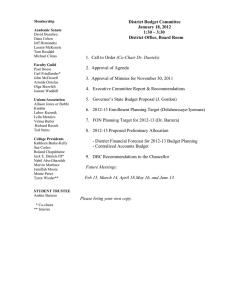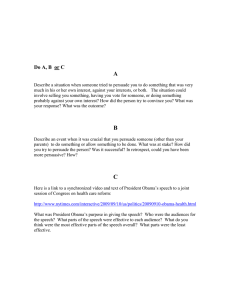Guidelines for Group Project US Military Budget & Force Planning
advertisement

Guidelines for Group Project US Military Budget & Force Planning 17.953, Fall 2010 Presentation Date: Last Class The month is July 2011, and Indiana’s Republican Governor, Mitch Daniels, has just announced his intention to run for President. He has assembled a campaign team to advise him on national security and foreign affairs. You are that team. Governor Daniels is to deliver his first major foreign policy speech at the Citadel in midSeptember. The Governor has asked you to brief him on a coherent and comprehensive national security strategy and plan, consistent with his philosophy and with his previous statements and actions. In particular, he wants your advice on grand strategy and on any tradeoffs he should consider among the various tools of statecraft and security, including the military, homeland security, intelligence, diplomacy, and foreign aid. In addition, he seeks advice on military strategy, force sizing principles, and suitable changes to force structure, modernization programs, military infrastructure, and military personnel policies. Governor Daniels is proud of his reputation as a fiscal conservative. As director of the White House Office of Management Budget during the first term of President George W. Bush, he earned the nickname “Mitch the Knife” for the budget cuts that he demanded and enforced. He believes that the nation’s economic woes and mounting federal debt represent a “genuine national emergency,” and that the United States will not be secure until those problems are fixed. He is a strong proponent of civilian foreign assistance, stemming from his days on the staff of Senator Richard Lugar, who at the time was Chairman of the Senate Foreign Relations Committee. The candidate is determined that his national security policy should be affordable and his foreign policy less ambitious than those of President Obama or President George W. Bush. Update on the security environment The security situation in Iraq has improved. The Iraqi government continues to demand that the United States honor the status of forces agreement by ending its military presence in Iraq by the end of this year, and President Obama has said that he plans to do that. The Obama administration’s December 2010 report on the Afghanistan strategy review was more positive than anticipated. Since then, progress on the political and security fronts in Afghanistan has exceeded expectations. Consistent with that progress, President Obama has announced plans to reduce the U.S. presence in Afghanistan to 35,000 troops by the end of his first term. During the past eight months, several new international terrorist plots against the United States and Europe have been uncovered and averted; none has succeeded. Early in 2011, President Obama and a group of European leaders struck a permanent agreement with Iran that would ensure Iran could meet its energy needs and at the same time verifiably halt the country’s march toward a nuclear weapons capability. Previous Statements by Mitch Daniels In previous statements, Governor Daniels has said the following: • "Can we continue with every mission we've assigned the military indefinitely? Is every one essential to the safety of Americans? …. You may have to stop doing some things completely. We are now borrowing the entire defense budget from international investors." • “If we go broke, no one will follow a pauper.” • “It is time for the United States to reconsider its military commitments overseas.” • We can and must reduce the size of federal government. As President, I will commit to real reductions of five percent from the discretionary budget in every year of my first term—and no, defense will not be off the table. Governor Daniels has indicated to you that he is willing to take the political heat that will come from endorsing deep cuts to security spending, as most U.S. troops will soon be home from Iraq and Afghanistan. He believes that a non-war, steady-state annual budget of $560 billion for defense, international affairs, and homeland security (in FY 2011 dollars) should be achievable by the end of his first term. (This is about a $140 billion reduction from the FY 2011 figure of $698 billion.) Your assignment The students taking the course for a grade will work on this project together, with the participation and help of the other participants in the class. I will play the role of Governor Daniels. The product of your work will be a 50-minute Power Point briefing (followed by my questions), which you will present to me during our final class period. Each student taking the course for credit should have a speaking role during the presentation. Student grades will be based on the presentation and on annotated briefing charts, which are due the same day. Your plan should include a discussion of grand strategy and military strategy. It should outline any changes over the next presidential term to military force structure, modernization programs, infrastructure plans, and personnel policies. For each of your recommendations, you should describe the effect in terms of national security capacity and also the budgetary impact (by service or agency and by appropriation title, to the extent possible) for each year between 2013 and 2017. (Please work in terms of Budget Authority; constant 2011 dollars will be fine; this is not an outlay or inflation drill). Be clear about how your choices are related to the strategy and to your candidate’s philosophy. MIT OpenCourseWare http://ocw.mit.edu 17.953 U.S. Budgets for National Security Fall 2010 For information about citing these materials or our Terms of Use, visit: http://ocw.mit.edu/terms.






